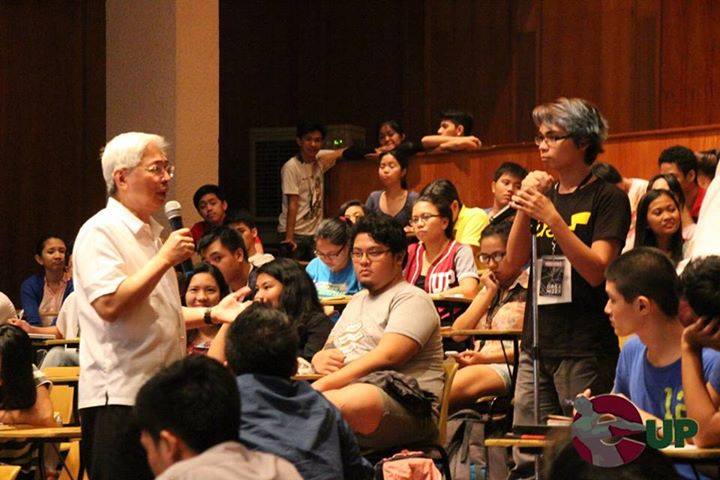University of the Philippines president Alfredo Pascual urged the UP community to be open-minded about the eUP project during a forum at the College of Engineering Theatre, Tuesday.
The eUP project, launched in 2012, aims to modernize the facilities by upgrading its information and communication technology (ICT) systems which Pascual said will benefit the entire university.
The president had signed a contract in 2012 with telecommunications company PLDT for the installation and maintenance of the new enterprise resource planning (ERP) software Oracle, which is used by universities like the National University of Singapore and De La Salle University. Pascual paid PLDT P143 million, as specified by the contract.
Prof. Ramon Guillermo, chairperson of the All UP Academic Employees Union, said the project lacked transparency since hardly a lot of students knew about the project.
Pascual said the eUP project is on the “basis of what [he knows] is best for the university.”
“To decide on what software to use, it will take you away from your studies,” Pascual said.
Under eUP is the new Student Academic Information System (SAIS), an online platform where students enroll and see their grades, among its other functions. It was pilot tested in UP Manila last year, where it gathered a number of complaints due to the inability to input student numbers, a “shopping cart” type of course enlistment and grade fluctuations, among others.
It will replace the 17-year Computerized Registration System (CRS), which is only on its third version, Pascual said. Around P40 million has been spent on the maintenance of the CRS.
With the implementation of a new enrollment software under the eUP project, expenses will be reduced to only P215 million.
“What’s cheaper? A software that can be used by just one entity, being developed by a team, or a software that will be used by hundreds?” Pascual asked.
Guillermo said there were also delays in implementation and overruns in the cost of the eUP. He also pointed out that proprietary software like Oracle is more susceptible to vendor lock-ins.
The professor said the best option for an efficient ICT system is to combine in-house development of the CRS with involvement in a larger open-source ERP project. Open-source ERPs, like the Kuali Open Library Environment system, have the benefits of having no licensing costs, independence from the vendor, and self-customization, among others.
“They said that ERPs will replace legacy software. CRS is not legacy, it is our cutting edge,” Guillermo said.
Pascual countered the critiques, saying there is no such thing as a free open source software (OSS) and universities who have used OSS have not reached the same quality of ERP as Oracle. He used the example of University of California, Berkeley, who withdrew from their OSS after spending around $10 million, or P459 million, on it.
The president aims to eventually develop an ERP system that can be distributed internationally.
So far, eUP costs around P724 million, which was taken from the academic unit budget. Pascual said the amount being spent on the project will not have a major effect on the P13 billion budget allotted for the UP system, and that the benefits of the project outweigh the costs.
“I’m not shortchanging anybody. The money you’re spending here is incremental so I can bring UP to modernity,” he said.
Pascual also assured the students there is no decrease in the 2016 UP budget allotted by the Department of Budget and Management, and that the cost of the software will not have a significant impact on the budget.
This article first appeared on Facebook on Oct. 9, 2015.










